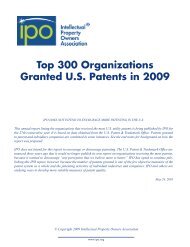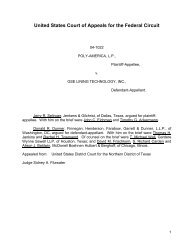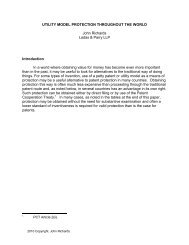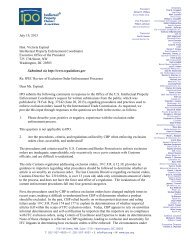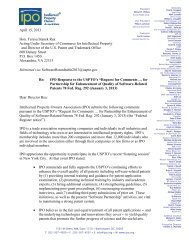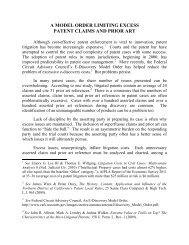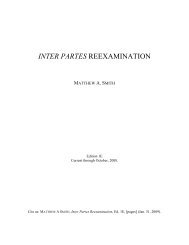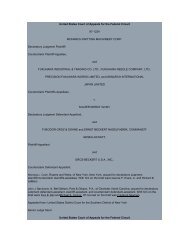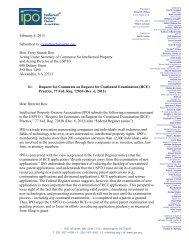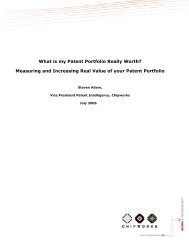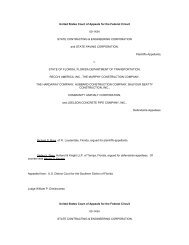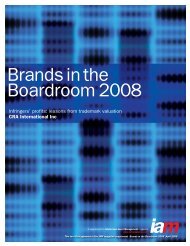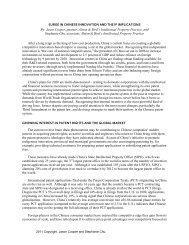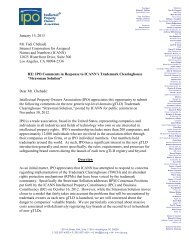Ruiz v. A.B. Chance Co.
Ruiz v. A.B. Chance Co.
Ruiz v. A.B. Chance Co.
You also want an ePaper? Increase the reach of your titles
YUMPU automatically turns print PDFs into web optimized ePapers that Google loves.
personnel had "ever made any comments or engaged in any overt conduct that might . . . be perceived as<br />
evincing hostility towards <strong>Ruiz</strong> based on his Hispanic background."<br />
Because the evidence presented to the district court was not sufficient to create a genuine issue of material<br />
fact, we affirm the district court’s grant of summary judgment on the section 1981 claim.<br />
B. Breach of <strong>Co</strong>ntract<br />
<strong>Ruiz</strong> and Fasteel allege that the district court erred in granting summary judgment on their breach of contract<br />
claim. The relevant portion of the Distributorship Agreement between Fasteel and <strong>Chance</strong> states:<br />
This Agreement may be terminated at any time for any reason upon (1) sixty (60) days written notice by<br />
DISTRIBUTOR to CHANCE, or (2) upon one (1) year’s written notice by CHANCE to DISTRIBUTOR, OR (3)<br />
as mutually agreed upon in writing by both parties. (emphasis added).<br />
<strong>Ruiz</strong> and Fasteel argue that the language "for any reason" requires "a good reason." To support their<br />
interpretation, <strong>Ruiz</strong> and Fasteel offer extrinsic evidence of a conversation between Bill Edwards, a <strong>Chance</strong><br />
Vice-President, and <strong>Ruiz</strong>, where Edwards allegedly told <strong>Ruiz</strong> that the agreement would only be terminated<br />
for "a good reason," and only after Fasteel received notice of any deficiency and had an opportunity to cure.<br />
<strong>Ruiz</strong> and Fasteel also argue that the "usage of the trade" demonstrates that termination cannot occur absent<br />
good cause.<br />
The district court found that <strong>Ruiz</strong> and Fasteel failed to provide evidence sufficient to create a genuine issue<br />
of material fact on their breach of contract claim. Under Missouri law, unless the contract is ambiguous,<br />
extrinsic evidence cannot be admitted to contradict, alter, or add to the terms of a contract. See, e.g., Stewart<br />
Title Guar. <strong>Co</strong>. v. WKC Restaurants Venture <strong>Co</strong>., 961 S.W.2d 874, 881 (Mo. Ct. App. 1998). Further, usage of<br />
trade evidence cannot be admitted because it would violate Paragraph 25 of the Distributorship Agreement<br />
which states that "no course or prior dealings and no usage of trade shall be relevant to supplement or<br />
explain any terms used in this Agreement." Accordingly, the district court properly found that the contract at<br />
issue here is unambiguous in allowing termination of the contract for "any reason." See, e.g., Emerick v. Mut.<br />
Benefit Life Ins. <strong>Co</strong>., 756 S.W.2d 513, 522 (Mo. 1988) (en banc) (holding that language "at any time" meant<br />
that party had no obligation to provide reasons). Summary judgment was appropriately granted.<br />
C. Breach of the Implied Duty of Good Faith and Fair Dealing<br />
<strong>Ruiz</strong> and Fasteel’s third non-patent claim charges <strong>Chance</strong> with breaching the Distributorship Agreement’s<br />
implied duty of good faith and fair dealing. This duty was breached, <strong>Ruiz</strong> and Fasteel allege, because: 1)<br />
<strong>Chance</strong>’s anti-Hispanic bias resulted in Fasteel’s termination; 2) <strong>Chance</strong> offered no reason for terminating<br />
Fasteel; and 3) after the termination, <strong>Chance</strong> dealt directly with Fasteel’s dealers.<br />
Missouri law implies a duty of good faith and fair dealing in every contract. See, e.g., Farmers Elec. <strong>Co</strong>op.,<br />
Inc. v. Mo. Dep’t of <strong>Co</strong>rrections, 977 S.W.2d 266, 271 (Mo. 1998) (en banc). To prevail on a breach of duty<br />
claim, the party must present "substantial evidence" that the other party "acted in bad faith or engaged in<br />
unfair dealing." Acetylene Gas <strong>Co</strong>. v. Oliver, 939 S.W.2d 404, 410 (Mo. Ct. App. 1996). The district court<br />
properly found that <strong>Ruiz</strong> and Fasteel failed to present "substantial evidence" that <strong>Chance</strong> breached the<br />
implied duty of good faith and fair dealing. <strong>Ruiz</strong> and Fasteel presented no credible evidence that <strong>Chance</strong>’s<br />
termination was motivated by racial animus or that <strong>Chance</strong> failed to proffer a reason for terminating Fasteel.<br />
Further, Paragraph 12 of the Distributorship Agreement expressly provides that <strong>Chance</strong> is permitted to "sell,<br />
lease or transfer" its products to other purchasers "wheresoever the latter may be located." Thus, the lack of<br />
existence of a genuine material fact supports the district court’s grant of summary judgment.<br />
D. Promissory and Equitable Estoppel<br />
<strong>Ruiz</strong> and Fasteel’s fourth claim alleges that they sustained damages of over one million dollars in relying on<br />
<strong>Chance</strong>’s representations to their detriment. The district court properly found that <strong>Ruiz</strong> and Fasteel cannot<br />
rely on a theory of equitable estoppel because under Missouri law, equitable estoppel "is an affirmative<br />
defense or an affirmative avoidance in response to an affirmative defense." Hoag v. McBride & Son Inv. <strong>Co</strong>.,<br />
967 S.W.2d 157, 171 (Mo. Ct. App. 1998). The district court also properly found that a cause of action for<br />
promissory estoppel is not available. Under Missouri law, promissory estoppel is not available as a cause of



